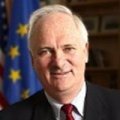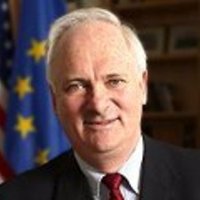If the EU is to survive as a political project, it needs to create a European democratic constituency that complements the democratic constituencies to which national leaders appeal. The EU needs a political heart to sustain its economic body.

Next Thursday’s European Council is seen by some as crucial to the future of the European Union as a political project.
President Macron of France has raised the stakes saying that unless there is agreement on a fund of 400 billion euros to mitigate the effect of the lockdowns across the EU and the Eurozone, both the Euro and the EU itself will be in danger. He says, “If we can’t do this today, the populists will win, today, tomorrow and the day after in Italy, in Spain and perhaps in France.”
He is right to issue the warning, but there is a real risk that this sort of rhetoric will create a self fulfilling prophecy. Expectations need to be managed and false dawns avoided.
Some of the populist criticism of the EU is misdirected, and needs to be contradicted.
In fact the EU, as such, has responded quite quickly to coronavirus. EU institutions, like the European Central Bank and the European Commission, have acted much more promptly in response to cononavirus crisis of 2020, than they did to the Banking crisis of 2008 and the sovereign Debt crisis of 2010. This is in spite of the huge handicap of having to meet by teleconference.
A proposal for a Coronavirus Response Investment Initiative has already been approved by the European Parliament and the Council and is in force as of the 1st of April. This will allow the use of EUR 37 billion under cohesion policy to address the consequences of the COVID-19 crisis.
It is not the EU institutions, but the Ministers of some of the member states of the euro, who have been unable to make decisions. They are the ones who were unable to decide on Eurobonds, or an acceptable substitute. It has been Ministers of the member states, not officials of EU institutions who have made undeliverable demands of, and used unacceptable language about, one another. It is competing nationalisms that have failed us so far.
Indeed this failure of competing national narratives was predictable. CO2 does not respect national boundaries and nor do deadly viruses. They transcend national boundaries, so the response to them must transcend national boundaries too.
The opposition to mutualisation of debt in countries like Germany and Netherlands is almost theological. Eurobonds are a good idea but they are just another form of borrowing. The interest may be a bit lower but it is still a debt. Eurobonds cannot be set up quickly, and speed is important. The bond buying by the ECB, which is already under way, has been much more effective. It has eased the financial pressure on Italy and Spain, and bought time for the EU to come up with a more comprehensive recovery programme.
The key here is the Recovery Fund, which was agreed in principle by the Finance Ministers of the Eurogroup last week. This Fund is to be aimed at providing funding, through the EU budget, to programmes designed to kick-start the economy in line with European priorities and ensuring EU solidarity with the most affected member states.
Such a fund would be temporary, targeted, and commensurate with the extraordinary costs of the current crisis, and would help spread them over time through appropriate financing.
The Summit on Thursday next will need to decide on the legal and practical aspects of such a fund, including its relation to the EU budget, its sources of financing, and on innovative financial instruments, consistent with EU Treaties. This is a huge task because the EU budget at the moment is only 1% of EU GDP, and is already committed to other things(notably agriculture).
One solution might be for EU to borrow additional money, on its own account on a long term basis, and that a new, but temporary, EU tax to be agreed to in principle to provide a reserve from which these loans could eventually be repaid. An EU wide carbon tax to fund this is one possibility. Of course this would be difficult to accept, but extra borrowing that is not backed by pre agreed repayment capacity is difficult to accept too!
Meanwhile we must all realize that a breakup on the Euro would also destroy the European Single Market. That will happen unless voters in all EU states think as Europeans, not just as nationals of their own state.
Without the euro there would be competitive devaluations of national currencies, and these could lead to retaliatory trade restrictions, which would destroy the Single Market.
Oddly enough, it is the countries that are most resistant to mutualising debt who benefit most from being in the EU Single Market.
The German based Bethelsmann Foundation has said that “countries like Germany, France, Belgium, Netherlands and Denmark benefit more strongly than regions in the southern and eastern periphery of Europe” from the EU Single Market.
President Macron is right to say that the political legitimacy of the EU is being challenged.
Why is this?
The reasons are psychological as well as political.
The voters of EU countries rarely get a chance think as Europeans. They are never asked to vote on purely EU issues, and are not confronted with realistic choices about what the EU might do, and what it might cost them.
European Parliament elections are really national popularity contests about national attitudes. So the EU becomes remote. The EU is “someone else paying”. It is “them” rather than “we”.
That has to change if the EU is to have the necessary strategic and political depth to deal with crises like the one we are now going through.
If the EU is to survive as a political project, it needs to create a European democratic constituency that complements the democratic constituencies to which national leaders appeal. The EU needs a political heart to sustain its economic body.
A Conference on the Future of Europe is to be set up to look at that in the next few months. The EU Heads of Government should send a signal that they intend to take the need for genuine EU wide democracy seriously.
Rather than rely solely on the European Parliament, whose members are all elected in national contests, we need an EU wide electoral contest, if we are to create an EU wide identity and EU wide democratic legitimacy.
One way to do this would be to have the President of the European Commission elected by the voters of the EU. This could be done either by using the Single Transferable Vote, with which we are familiar in Ireland, or by a two round system like the one used in French Presidential Elections. Voters identify with personalities as well as policy programmes and it is personalities who can create the emotional bonds between European citizens, that are needed to make European financial bonds politically viable. Another (weaker) proposal would be to elect some MEPs from an EU wide constituency.
Next week will indeed be crucial for the European Union. It needs to get the economics right, but itals needs to get the politics and the psychology right too. Leo Varadkar will have a vital role to play.

John Bruton was the Prime Minister of the Republic of Ireland (1994-97) and the European Union’s Ambassador to the United States (2004-09). He had held several important offices in Irish government, including Minister for Finance, Minister for Industry & Energy, and Minister for Trade, Commerce & Tourism.
